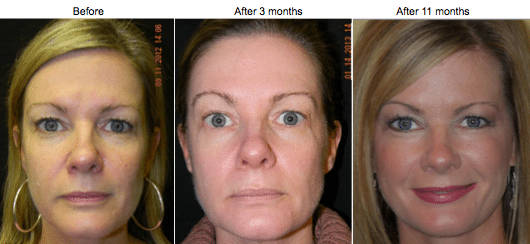According to Mintel, 37% of US women have used anti-aging creams and serums for the face growing it to a $2.3 billion business. Anti-aging skincare product claims and benefits continue to become more scientific and results-oriented, but how do consumers really know that these products are working?
Dr. Anne explains the value of prescription-strength skin care products.
What is the best way to select skin care products that are right for one’s skin?
The key part of your question is “right for one’s skin.” There are few research studies that put top skin care lines to the test. Consumer Reports continues to test and publish their results of OTC top sellers from department stores, mass merchandisers and drug stores and they usually find the same thing: “After six weeks of use, the effectiveness of even the best products was limited and varied from subject to subject. Every serum we tested produced a visual change in wrinkle length or depth for at least one person and did nothing for others.”
The key take away for consumers is that an OTC product may work for one person, but do nothing for others.
Why would a product work for one person, but not another?
Couple of reasons:
1) Each of our skins’ has unique needs that need to be match with the right skin care practices and products.
2) Food and Drug Administration, which oversees cosmetic safety and labeling, doesn’t require manufacturers to test the products for efficacy, let alone test for whether they meet their claims, though claims must be “truthful and not misleading.” Consumers are either relying on manufacturers’ marketing pitches or word-of-mouth from someone who may have vastly different skin requirements.
It seems that every year there is a new multi-level marketing skin care product that solves nearly every skin care problem and works on all types of skins and all ages and yet there are no scientific studies to back up the product claims. Physicians and skin care professionals will cut through the marketing hype, look at the science and research studies behind the product before selecting products for patient use.
Are the skin care products available only from physicians’ offices better than those available over-the-counter?
Yes. The products available at a physician’s office are clinically proven and many come in strengths that are not available to consumers at mass – drug or department stores. For example:
Tretinoin (Retin-A® and Renova®)
Retin-A® is a prescription medication approved by the Food and Drug Administration (FDA) in 1971 to treat acne. Since then, the drug has also been shown to improve skin texture and color when used over an extended period of time. This drug exfoliates (removes a layer of skin cells) the skin, helps even out pigmentation and minimizes fine lines.
Tretinoin also makes the skin more sensitive to ultraviolet rays from the sun. Therefore, a broad-spectrum sunscreen must be used to prevent sun damage.
Hydroquinone
This lightening cream is used to treat darker spots, such as those that occur with melasma (hyperpigmented areas on the face). Prescription hydroquinone is available in three and four percent concentrations. Whenever you’re using hydroquinone, you should always use sunscreen, as the treatment will increase your sensitivity to light.
We ran a 3-month skin care contest at Anne Therese Aesthetic Medicine recently using the Obagi Nu-Derm system and here is the before and after photo of the top contestant.

Lisa used the Obagi Nu-Derm system — clinically proven, prescription-strength ingredients that work at the cellular level to improve your skin cell function. As you can see, skin care lines availably only from physicians’ offices do produce undeniable results. We now carry Dr. Obagi’s new line of skin care – ZO Medical Based on the latest advances in skin therapy technology – biotechnology complexes, plant stem cell components, and multi-therapy delivery systems.
Is there a limit to what skin care product can do, even the prescription-strength products?
Yes, the best use of skin care products is prevention — or at least slowing the natural effects of aging and for use after a laser or peel treatment which effectively strips away wrinkles, lines, crepey-ness and pigment. It doesn’t make sense to have a treatment to remove the effects of aging and not protect your investment with skin products that work.
Are there differences in the prescription product lines available at your office?
Yes, The best first step in selecting a skin care line is to have a skin care professional evaluate your skin and select the best products to work with your skin type and your lifestyle. Consistent use of skin care products that are backed up by clinical studies provide our patients with results. We provide a free consultation for anyone who wants to have their skin evaluated along with their current skin care products and practices.


